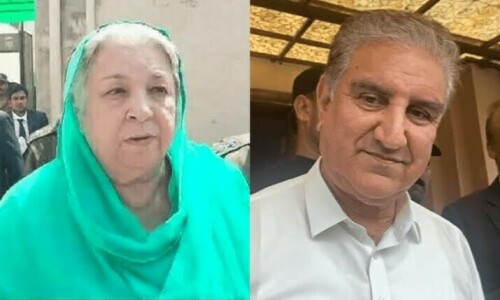ISLAMABAD: Some are taking notes on writing pads placed on wooden tables, the surfaces of which bear the etchings of bored students; others are just staring at the lecturer, and a few are stealthily taking a nap in the back row — these 53 police officers, mostly in their mid-forties, are taking a class in how to improve the reporting of crime scenes.
“Your report should match that of the medico-legal expert performing the postmortem,” explains the lecturer, a retired police officer. His students, station house officers (SHOs), have the paunches, unkempt faces and worn-out uniforms found in police stations across the country. As a prerequisite for promotion, they have to complete a one-year advanced police course, for which they have to enrol at this police academy, the Sihala Police College.
Established in the late 1950s on the outskirts of Islamabad, this police training school is spread over 350 acres and is the largest training school in Pakistan, credited with training thousands of police officers since its inception. It trains not just senior police officers but also those joining the service and those in mid-career. As they pass their respective training modules, they become eligible for promotion.
State-of-the-art technology is available at this facility and the faculty is impressive — even so, ground realities remain discouraging, officials here agree.
“The facilities available at police stations are not on a par with those at this school because the government doesn’t spend as much as it should on their budgets,” says Shahzad Saleem, an instructor at the school, as we walk towards the scientific training wing. Here, a class is being taught how to lift fingerprints from a crime scene.
“Not all police stations have the investigation kits to carry out their jobs so it is quite hard to do conduct a thorough investigation.”
At the scientific training wing I get a tour of the equipment room which contains different tools used in crime scene investigations. On one of the walls, the details of the attack in which Benazir Bhutto was killed are pinned on a notice board. Amongst them are X-rays of her skull, a sketch of the face of the bomber and remains of her destroyed vehicle.
“Was the killer identified?” I ask.
“No, because he was a foreigner,” says one of the instructors there with conviction — even though most reports suggest that the bomber came from the tribal areas.
The next stop is where crime scenes are re-enacted and policemen are told to write a crime scene report. A car is parked nearby which the instructor tells me was recently blown up to teach students how to collect evidence after such acts of terror.
“Our main focus is counter-terrorism because that is the biggest threat,” he explains. “The police force is at the forefront of this war.”
Subsequently, we visit the junior campus and on the way the instructor shows me the firing range and the stables where horse-riding is taught. We also make a quick stop at the physical fitness training ground; the chief trainer here is a grey-haired man with a potbelly.
“How is it that everyone is so overweight?” I ask him.
“This is the reduced version,” he says with a hearty laugh. “When they come here, we make them shed ten kilos each. But their eating habits are bad.”
At the junior section I realise why, even though it is on the frontlines, the police may not be able to counter this existential threat.
The young recruits are just finishing with their classes. As we begin our discussion, it moves towards the ongoing peace talks.
“Talking to those who are killing us and not communicating a clear policy demoralises us,” says one officer who joined the academy recently. But as he tries to explain, one of his colleagues interrupts and dismisses his analysis.
“It’s the foreign agencies,” he insists. “If they stopped meddling in Pakistan, we would have peace!”
While all trainees nod their heads in agreement, the only one of them who belongs to south Punjab rejects this popular conspiracy theory. “Let’s not blame others,” he points out. “It’s actually the result of our own security policy. If we start punishing all of them instead of being sympathetic towards some extremist groups, especially the ones in Punjab, then terrorism could be defeated.”











































